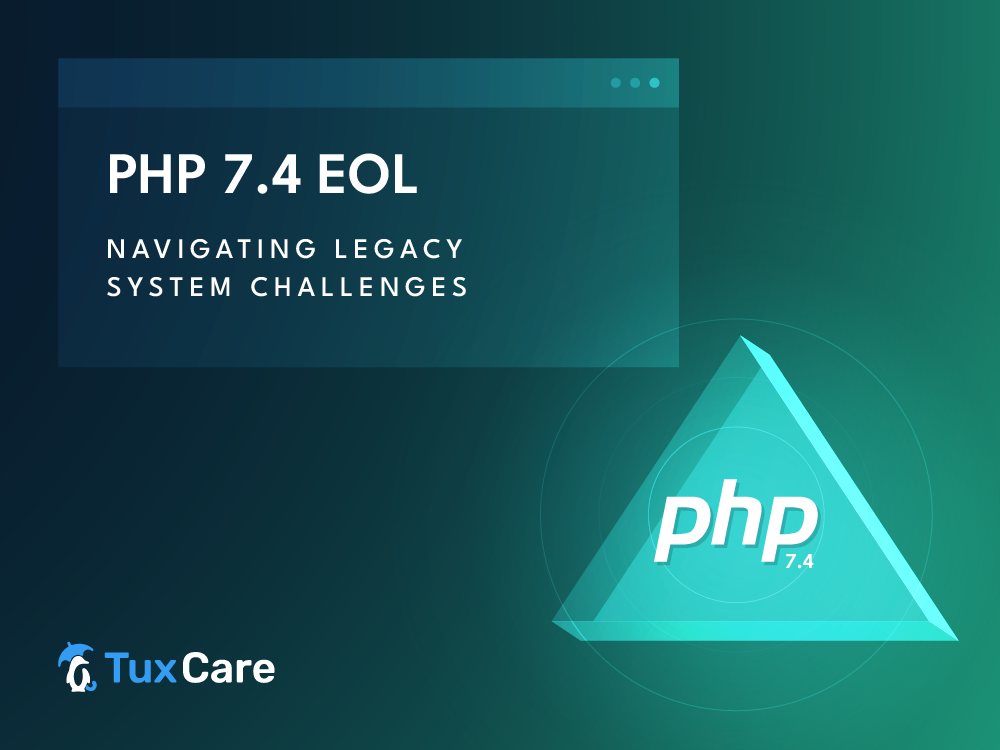PHP 7.4 EOL: Navigating Legacy System Challenges
- After PHP 7.4 EOL, it is difficult to maintain PHP 7.4-based applications securely due to the increased risk of security breaches.
- Upgrading to newer PHP versions may result in downtime as there have been lots of deprecations and breaking changes.
- Tuxcare’s PHP Extended Lifecycle Support provides essential security updates and patches for end-of-life PHP versions after the EOL date.
A legacy system is an outdated software, hardware, or technology that is still in use within an organization. These systems are typically older and become outdated because they are no longer supported by vendors. For instance, PHP 7.4, one of the most widely used PHP versions, reached the end of life (EOL) on November 28, 2022. However, PHP 7.4 is still in widespread use in web applications. According to W3Tech usage statistics, 30.3% of known server-side programming languages in use across websites are running the PHP 7.4 EOL version.
But did you know that using PHP 7.4 today presents several challenges, including security vulnerabilities, compatibility issues, and performance limitations? In this article, we’ll explore the hurdles of maintaining PHP 7.4 post-EOL and offer strategies for risk mitigation and potential upgrade paths.
What Does PHP 7.4 End of Life Mean?
PHP 7.4 EOL means the PHP 7.4 branch has ceased to be supported. That means this PHP version will not receive new bug fixes and security updates. As a result, the applications built on it could no longer be compliant with security and data protection regulations. Therefore, it is crucial to manage and mitigate such kinds of risks and migrate PHP 7.4 applications to newer supported versions.
Every PHP user is recommended to upgrade to the latest version of PHP, although it is not mandatory. However, after the software reaches the end of life, it becomes difficult to maintain the system securely, as the risk of security breaches increases. The potential legal actions, penalties, and reputational harm caused by data breaches would far outweigh the cost of migration and upgrades.
Risks Associated with Maintaining PHP 7.4 EOL
With the end of official support for PHP 7.4, businesses face several risks and challenges:
Security Vulnerabilities
Without updates and patches, PHP 7.4 applications are highly vulnerable to emerging security vulnerabilities. Attackers are quick to exploit issues in unsupported software where vulnerabilities remain unaddressed.
Compatibility Issues
Over time, libraries, frameworks, and third-party services may drop support for PHP 7.4. This can lead to compatibility issues and hinder the functionality of the application.
Performance Limitations
With no further updates, PHP 7.4 EOL also lacks the performance improvements and optimizations introduced in later versions. The applications running PHP 7.4 may suffer from suboptimal performance, which can impact user experience.
Compliance Concerns
Running unsupported software puts businesses with regulatory requirements at risk for non-compliance. Failing to comply with industry standards can result in penalties and legal repercussions.
Risk Mitigation Strategies
To mitigate the risks associated with maintaining PHP 7.4 applications after end of life, consider the following options:
Extended Support
Upgrading to newer PHP versions may result in downtime, as there have been lots of deprecations and breaking changes. Therefore, it will require thorough testing and extra costs and time depending on how much your application uses deprecated features.
If upgrading is not feasible at the moment for your production systems, you can consider using extended support for PHP 7.4. Tuxcare’s PHP Extended Lifecycle Service provides essential security updates and patches for end of life PHP versions beyond the official EOL date. This helps ensure your PHP 7.4 EOL applications remain secure and compliant with regulatory requirements while you focus on planning your migration carefully.
Potential Upgrade Paths
The most secure option is to upgrade directly to the latest stable version of PHP (currently PHP 8.3 as of March 2024). PHP 8.3 will be supported until 23 November 2026. However, this may require major code changes to ensure compatibility so your applications can function seamlessly.
Final Thoughts
Maintaining applications after PHP 7.4 EOL is a gamble. Although it might function for a while, the security risks and limitations it presents pose a significant threat. Businesses can navigate these challenges effectively with extended support service and planning for strategic upgrades. Analyzing the costs and time involved in implementing extended support and the upgrade process will help you determine the most cost-effective course of action for your organization.
If you have any questions, ask our experts to learn more about extending PHP version support.



 Documentation
Documentation Login
Login




